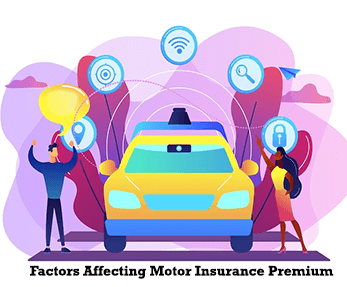What's Inside?
What Is Motor Insurance?
Motor insurance, referred to as auto or car insurance, offers financial protection to individuals who own and operate vehicles. This insurance type safeguards against diverse risks and liabilities associated with vehicle ownership. Essentially, it establishes a contractual agreement between the vehicle owner and the insurance provider. Under this agreement, the insurer commits to covering specified losses or damages in return for the payment of a premium by the policyholder.
Motor insurance serves as a financial safeguard for vehicle owners, providing coverage in scenarios like accidents, theft, or unexpected incidents leading to damage to their vehicle, third-party property, or causing injuries to others.
Features and Benefits of Motor Insurance
The characteristics and advantages of motor insurance may differ based on the specific coverage you opt for, whether it’s Third-Party Liability or Comprehensive Insurance. Below are the overall features and perks of motor insurance:
Coverage against Accidents: Motor insurance offers financial security in case your vehicle incurs damages due to accidents, collisions, or overturning, shielding you from potential financial losses.
Theft Coverage: In case your vehicle is stolen, motor insurance can compensate you for the value of the stolen vehicle.
Third-Party Liability Coverage: If you cause an accident that results in injury or death to a third party or damages to their property, motor insurance covers your legal liabilities.
Personal Accident Cover: Many motor insurance policies include personal accident cover for the owner/driver of the insured vehicle, providing compensation in case of accidental death or permanent disability.
No Claim Bonus (NCB): If you do not make any claims during the policy period, you are eligible for a No Claim Bonus, which leads to a premium discount during the renewal.
Add-ons and Optional Coverages: Comprehensive motor insurance offers a range of additional features to bolster your coverage, including options like zero depreciation protection, engine coverage, roadside assistance, and more, enabling you to tailor your policy to suit your specific needs.
Protection against Natural Disasters: Motor insurance offers coverage for damages caused by natural calamities like floods, earthquakes, cyclones, etc.
Protection against Man-Made Disasters: Car insurance extends its coverage to include harm inflicted by human-caused calamities such as riots, labor strikes, acts of vandalism, and similar events.
Coverage for Fire and Explosion: In the event of a fire or explosion, motor insurance can cover the damages to your vehicle.
Towing Assistance: Certain car insurance plans offer roadside assistance, including towing, to assist drivers in situations of vehicle breakdowns or accidents.
Cashless Claim Settlement: Numerous insurance providers facilitate cashless claim settlements specifically at affiliated garages, easing the monetary strain on policyholders when their vehicles require repairs.
Legal Support: Insurance companies typically offer legal assistance and support in case of legal disputes arising from motor accidents.
It’s essential to review and understand the specific terms and conditions of your motor insurance policy, including coverage limits, deductibles, exclusions, and claim procedures, to make the most of the features and benefits it offers. Different insurance providers may offer slightly different features and add-ons, so it’s advisable to compare policies before making a decision.
Types of Motor Insurance
In India, every vehicle operating on public roads must have motor insurance according to the Motor Vehicles Act of 1988. There are primarily two types of motor insurance policies offered in the country.
- Third-Party Liability Insurance:
Third-party liability insurance is the minimum legal requirement for all motor vehicles in India. It provides coverage against legal liabilities arising due to injury or death of a third party or damage to their property caused by the insured vehicle. This insurance does not cover damages to the insured vehicle or injuries sustained by the vehicle’s owner/driver. - Comprehensive Insurance:
Comprehensive insurance, often referred to as a package policy, is a thorough type of auto insurance that goes beyond just covering third-party liabilities. This insurance offers broad protection for the insured vehicle, safeguarding it against a range of risks such as accidents, theft, fire, natural disasters, and unexpected incidents. Furthermore, it includes coverage for third-party liabilities, providing a comprehensive safety net for both the vehicle owner and other parties involved.

Add-on Covers
These are additional benefits that can be added to a motor insurance policy for a nominal premium. Some common add-ons include Nil Depreciation Cover, Engine Protection Cover, Return to Invoice Cover, NCB Protect Cover, and Consumables Cover.
Comprehensive Car Insurance Inclusions:
Comprehensive car insurance provides extensive coverage for various incidents including accidents, civil unrest, strikes, acts of nature, theft, and liability towards third parties. Additionally, it offers personal accident protection for the driver.
Comprehensive Car Insurance Exclusions:
Comprehensive motor insurance provides coverage for a range of scenarios, but it excludes certain types of damages and situations. These exclusions include damages resulting from aging, wear and tear, mechanical or electrical breakdown, driving while intoxicated, driving without a valid license, consequential losses, and damages occurring outside India’s geographical boundaries.

Factors Affecting Motor Insurance Premium
The cost of a motor insurance policy is influenced by various factors. These include the level of coverage (comprehensive or third-party), the specific details of the car such as its model, make, and variant, as well as where the vehicle is registered. Premiums tend to be higher in cities categorized as Zone A, such as Mumbai, Delhi, and Chennai, compared to those in Zone B cities.
How to Reduce Premium for Motor Insurance Policy?
No Claim Bonus (NCB): If you have not made any claims during the policy period, you can earn a No Claim Bonus. This bonus leads to a reduction in the premium for the next policy renewal.
Voluntary Deductibles: Selecting a voluntary deductible implies that you commit to covering a specific sum personally in the event of a claim. By opting for a higher voluntary deductible, you can reduce the cost of your insurance premium.
Install Safety Devices: Installing safety devices such as anti-theft alarms, immobilizers, or GPS tracking systems can reduce the risk of theft or damage. Insurance companies may offer a discount on the premium if these safety features are installed in your vehicle.
Opt for Add-on Covers Selectively: Consider your requirements carefully when selecting add-on covers. These supplementary benefits can enhance your insurance policy, yet they inevitably come with a higher premium. Prioritize add-ons that align with your needs, steering clear of those that offer little value to your situation.
Compare Quotes: Obtain quotes from various insurance companies and analyze them to discover the most competitive rates for premiums. Utilize online comparison tools to effortlessly evaluate diverse policies and their associated premiums.
Drive Responsibly: Having a clean driving record, free from accidents or traffic infractions, can result in reduced insurance premiums. Certain insurers provide discounts to individuals who demonstrate a history of safe driving.

